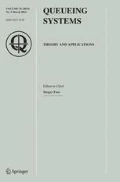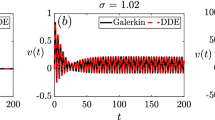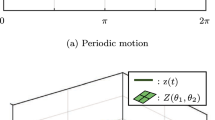Abstract
In this paper, transient and asymptotic behaviors of general Markov fluid models are studied and analyzed. The input and output rates are assumed to be modulated by a finite state irreducible Markov process, which can admit states with zero effective input rate. The main advantage of the proposed methods is their accuracy and their numerical stability. For the transient solution, properties of stationary detection lead to reduce considerably the computational complexity of the algorithm. As for the asymptotic solution, it is derived from the transient one's. We apply these methods to a general Markov fluid model and we interpret the numerical results.
Similar content being viewed by others
References
D. Anick, D. Mitra and M.M. Sondhi, Stochastic theory of a data-handling system with multiple sources, Bell System Tech. J. 61 (1982) 1871–1894.
D. Artiges and P. Nain, Upper and lower bounds for the multiplexing of multiclass Markovian on/off sources, Performance Evaluation 27/28 (1996) 673–698.
P.N. Bowerman, R.G. Nolty and E.M. Scheuer, Calculation of the Poisson cumulative distribution function, IEEE Trans. Comput. 39 (1990) 158–161.
D. Chen, Y. Hong and K.S. Trivedi, Second-order stochastic fluid models with fluid-dependent flow rates, Performance Evaluation 49 (2002) 341–358.
H. Kobayashi and Q. Ren, A mathematical theory for transient analysis of communication networks, IEICE Trans. Commun. E75-B 12 (1992) 1266–1276.
K.P. Kontovasilis and N.M. Mitrou, Markov-modulated traffic with nearly complete decomposability characteristics and associated fluid queueing models, Adv. in Appl. Probab. 27 (1995) 1144–1185.
H. Nabli and B. Sericola, Performability analysis: A new algorithm, IEEE Trans. Comput. 45 (1996) 491–494.
H. Nabli and B. Sericola, Performability analysis for degradable computer systems, Comput. Math. Appl. 39 (2000) 217–234.
Q. Ren and H. Kobayashi, Transient solutions for the buffer behavior in statistical multiplexing, Performance Evaluation 23 (1995) 65–87.
S.M. Ross, Stochastic Processes (Wiley, New York, 1983).
E.P. Segarra and J.G. Haro, Fluid-flow approach to evaluate the information loss probability in a finitebuffering switching node under heterogeneous on/off input traffic sources, Performance Evaluation 51 (2003) 153–169.
B. Sericola, Transient analysis of stochastic fluid models, Technical Report 3152, INRIA, France (April 1997).
B. Sericola, Transient analysis of stochastic fluid models, Performance Evaluation 32 (1998) 245–263.
B. Sericola and B. Tuffin, A fluid queue driven by a Markovian queue, Queueing Systems 31 (1999) 253–264.
T. Tanaka, O. Hashida and Y. Takahashi, Transient analysis of fluid model for ATM statistical multiplexer, Performance Evaluation 23 (1995) 145–162.
Author information
Authors and Affiliations
Rights and permissions
About this article
Cite this article
Nabli, H. Transient and Asymptotic Analysis of General Markov Fluid Models. Queueing Systems 47, 283–304 (2004). https://doi.org/10.1023/B:QUES.0000035316.24413.bf
Issue Date:
DOI: https://doi.org/10.1023/B:QUES.0000035316.24413.bf




